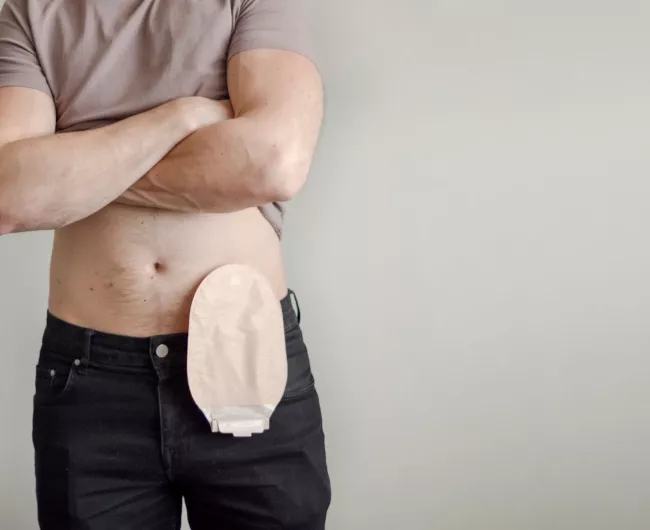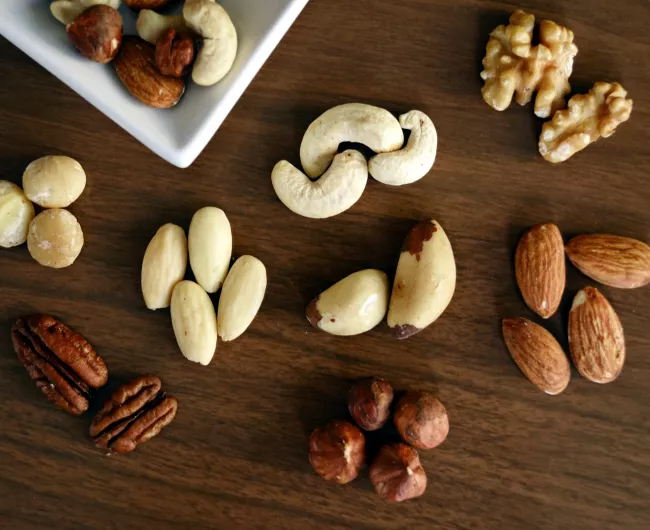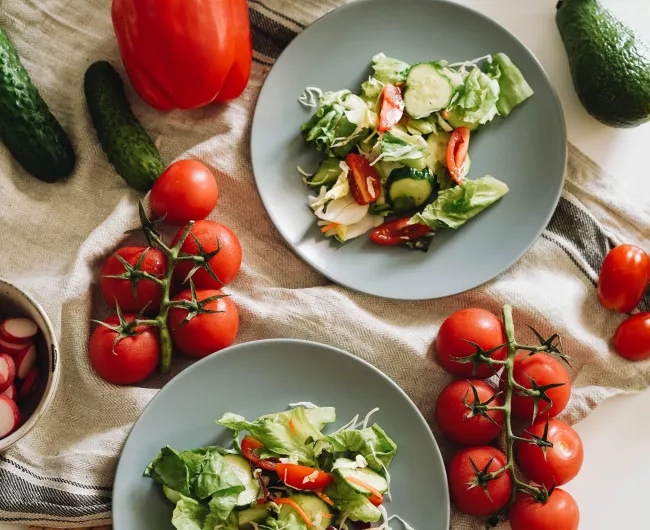Nutrition with an ostomy
Nutrition plays a big role in maintaining optimal health and well-being throughout your ostomy journey. Discover guidelines, tips, and resources.

Where to begin with ostomy nutrition
Begin your nutritional journey after ostomy surgery by eating small, frequent meals, maintaining consistent meal times, and prioritizing hydration to aid digestion and manage gas.
Our advice: Start small
Ease your way back to eating right with small amounts of food. Experts say to eat small amounts three or more times a day. Try to eat meals at the same time each day to help make going to the bathroom regular. Eating more often, in small amounts, and drinking enough liquids will help your body handle food and help with gas.
For the first few weeks after your surgery, it will be easier to digest simple and bland soft foods. Keep in mind that chewing your food well also helps with digestion. The more you break it up, the easier it will be for your body to handle. Be slow when adding high-fiber foods back into your diet, as these may be harder to digest and can cause blockages. Even though some people are told to avoid high-fiber foods to prevent blockage, fiber is important for keeping your colon healthy. Start small and slowly increase, and make sure to drink water throughout the day! Always follow the advice of your doctors or dietitian about any food restrictions right after surgery or in the long term.
If you are trying new foods, start them slowly and one at a time. This will help you to see how your body works with the new foods and if any will cause gas, constipation, strange smells, or diarrhea. Slowly add them into your diet and notice how your body responds to them. Remember that everyone is different, and what affects someone else may not affect you in the same way. This is why it can be helpful to write down how your body responds to different foods. Foods that you stop eating today because of gas or other issues may be okay to eat a few weeks later. Be patient and try foods in small amounts to see how things go. Keep in mind some foods may always be a problem.

Watch out for problem foods
Some foods are hard to digest and can cause blockages, including:
- Nuts
- Seeds
- Popcorn and corn
- Dried fruit
- Mushrooms
- Raw-crunchy vegetables
Eat small quantities at first, chew well, and drink plenty of water.

Common food reactions
Always try foods at home first. Knowing your digestive responses lets you worry less and enjoy more with friends. Below are common food reactions. Each person will have unique reactions.
How different foods may affect you:
| Gas producing | Asparagus, beans, beer, broccoli, Brussels sprouts, cabbage, carbonated beverages, cauliflower, chewing gum, cucumbers, dairy products (eggs, milk), legumes (lentils), melons, nuts, onions, peas, pickles, radishes, soy products, spicy foods |
| Incomplete digestion* | Apple peels, cabbage, celery, Chinese vegetables, coconut, corn, dried fruit, leafy green vegetables, mushrooms, nuts, pineapple, pith from citrus (white fibrous coverings of oranges), popcorn, raw/crunchy vegetables, raw/undercooked meat (sushi, rare steaks), seeds, skins from fruits, skins from vegetables |
| Thickened stool | Applesauce, bananas, cheese, creamy peanut butter, hot cereals (Cream of Wheat, oatmeal, rice), marshmallows, pasta, pudding, potato (without skin), rice, tapioca, unseasoned crackers, white bread/toast, yogurt |
| Thinned stool | Alcoholic beverages, apple juice, baked beans, chocolate, fresh/raw fruits, fresh/raw vegetables, fried foods, grape juice, high-sugar foods, leafy green vegetables, milk, prune juice, spicy foods |
| Increased odor | Alcohol, asparagus, broccoli, brussel sprouts, cabbage, cauliflower, dried beans, eggs, fatty foods, fish, garlic, legumes, onions, peas, radishes, smoked foods, strong cheese, some medications, some vitamins |
| Reduced odor | Buttermilk, cranberry juice, parsley, probiotics (e.g. yogurt), smaller/more frequent meals, staying well hydrated, odor eliminators (drops, gels, sprays, tablets, essential oils, sachets that can be placed in the ostomy pouch) |
| Constipation relief** | Bran products, coffee (warm/hot), fruit (fresh, raw, or cooked), oatmeal, prunes, raisins, vegetables (fresh, raw, or cooked), water, warm beverages, warm soups, whole grains |
| Color changes | Asparagus, beets, food colorings, iron pills, licorice, red jello, strawberries, tomato sauce |
*Mainly applies to an ileostomy. People with an ileostomy are at greater risk for
stoma blockage/obstruction. These food types should be eaten with caution and not introduced into the diet until 4-6 weeks after surgery. Introduce them slowly, one at a time, and chew well.
**Mainly applies to colostomy. Increasing the amount of fiber in your diet will help you avoid becoming constipated. Discuss options with your care team.
Top resources
Kat Sisler: From ostomy-opposed to ostomy-grateful
My cancer and ostomy journey began with a rude awakening in January 2023. My father was diagnosed with colorectal cancer at 42, and given that history, I asked my doctor at my yearly physical when I should begin screening.

Empowering lives: celebrating World Ostomy Day
Every year on the first Saturday of October, people worldwide come together to celebrate World Ostomy Day, also known as Ostomy Awareness Day. This day serves as a reminder of the resilience, strength, and courage millions of individuals display each year living with an ostomy.
How to cut and fit an ostomy wafer for a stoma
In this video, ostomate and certified patient and family support navigator Stephanie Rouse demonstrates how to cut and fit an ostomy wafer, or skin barrier, for a stoma.





